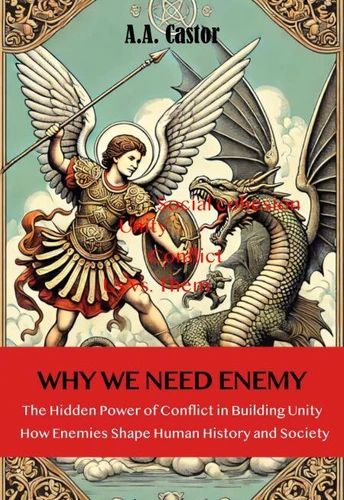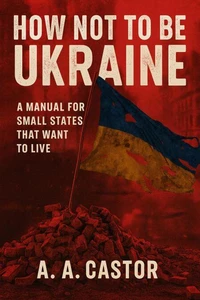Why We Need an Enemy: The Hidden Power of Conflict in Building Unity
Par :Formats :
Disponible dans votre compte client Decitre ou Furet du Nord dès validation de votre commande. Le format ePub est :
- Compatible avec une lecture sur My Vivlio (smartphone, tablette, ordinateur)
- Compatible avec une lecture sur liseuses Vivlio
- Pour les liseuses autres que Vivlio, vous devez utiliser le logiciel Adobe Digital Edition. Non compatible avec la lecture sur les liseuses Kindle, Remarkable et Sony
 , qui est-ce ?
, qui est-ce ?Notre partenaire de plateforme de lecture numérique où vous retrouverez l'ensemble de vos ebooks gratuitement
Pour en savoir plus sur nos ebooks, consultez notre aide en ligne ici
- FormatePub
- ISBN8227849625
- EAN9798227849625
- Date de parution05/10/2024
- Protection num.pas de protection
- Infos supplémentairesepub
- ÉditeurBig Dog Books, LLC
Résumé
"Why We Need an Enemy: The Hidden Power of Conflict in Building Unity" explores the paradoxical role of enemies throughout human history. From early tribal conflicts to the intricate dynamics of modern politics, this book delves into how the identification of a common foe has consistently united people, driven social cohesion, and shaped our collective identity. Whether it's nations rallying against a foreign threat, communities uniting against perceived social dangers, or political movements built around a shared adversary, the need for an enemy has been an enduring force that has both divided and brought people together. Through compelling historical examples, psychological insights, and analysis of group dynamics, "Why We Need an Enemy" reveals why conflict has been a driving force in both human progress and societal division.
Discover how political campaigns, social movements, and even friendship groups have used the concept of "us vs. them" to foster loyalty and unity. The book also questions whether we can find new ways to unite that don't rely on having an adversary-ways that encourage inclusion, shared values, and cooperation instead of division. Ultimately, this thought-provoking exploration challenges us to rethink the role of conflict in our lives and consider how we can build a more harmonious and inclusive society.
Discover how political campaigns, social movements, and even friendship groups have used the concept of "us vs. them" to foster loyalty and unity. The book also questions whether we can find new ways to unite that don't rely on having an adversary-ways that encourage inclusion, shared values, and cooperation instead of division. Ultimately, this thought-provoking exploration challenges us to rethink the role of conflict in our lives and consider how we can build a more harmonious and inclusive society.
"Why We Need an Enemy: The Hidden Power of Conflict in Building Unity" explores the paradoxical role of enemies throughout human history. From early tribal conflicts to the intricate dynamics of modern politics, this book delves into how the identification of a common foe has consistently united people, driven social cohesion, and shaped our collective identity. Whether it's nations rallying against a foreign threat, communities uniting against perceived social dangers, or political movements built around a shared adversary, the need for an enemy has been an enduring force that has both divided and brought people together. Through compelling historical examples, psychological insights, and analysis of group dynamics, "Why We Need an Enemy" reveals why conflict has been a driving force in both human progress and societal division.
Discover how political campaigns, social movements, and even friendship groups have used the concept of "us vs. them" to foster loyalty and unity. The book also questions whether we can find new ways to unite that don't rely on having an adversary-ways that encourage inclusion, shared values, and cooperation instead of division. Ultimately, this thought-provoking exploration challenges us to rethink the role of conflict in our lives and consider how we can build a more harmonious and inclusive society.
Discover how political campaigns, social movements, and even friendship groups have used the concept of "us vs. them" to foster loyalty and unity. The book also questions whether we can find new ways to unite that don't rely on having an adversary-ways that encourage inclusion, shared values, and cooperation instead of division. Ultimately, this thought-provoking exploration challenges us to rethink the role of conflict in our lives and consider how we can build a more harmonious and inclusive society.























